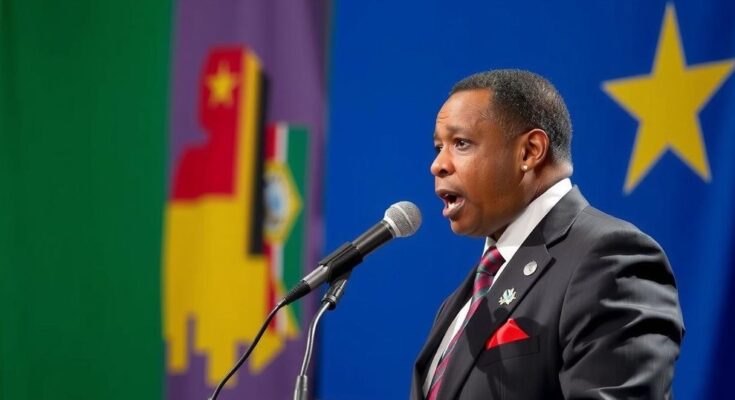Mauritius Prime Minister Pravind Jugnauth has acknowledged a likely defeat in the recent legislative elections, allowing opposition leader Navin Ramgoolam to potentially return to power. The elections unfolded against a backdrop of a wire-tapping scandal that raised major concerns about Mauritius’ democratic integrity. Both political factions presented platforms aimed at improving economic conditions for citizens facing rising costs of living.
Mauritius Prime Minister Pravind Jugnauth has acknowledged his coalition’s impending defeat in contentious legislative elections, thereby opening the path for the opposition’s ascension to power. Although the final results from the elections remain pending, it appears that opposition figure Navin Ramgoolam is poised to reclaim the prime ministership through his Alliance of Change coalition. In his remarks to the press, Jugnauth indicated that the electorate had opted for a different governance team, emphasizing the necessity to respect their choice and wishing them well.
The electoral count experienced delays attributed to several incidents on election day, which hampered the transport of ballot boxes to the counting facilities. The unique winner-takes-all electoral framework typically results in dominant coalitions securing seats in the 70-member National Assembly, with 62 positions contested in this election. This situation is compounded by the controversial “best loser” system allocati ng the remaining eight seats.
Jugnauth’s recent political narrative revolved around a significant agreement with Great Britain for Mauritius to regain sovereignty over the Chagos Islands, a matter of much contention. Despite having served as Prime Minister since 2017—after succeeding his father—his campaign was marred by an alarming wire-tapping scandal linked to the leak of private conversations involving various political and civil sectors. The subsequent imposition of a social media ban before elections, which was later rescinded, raised alarms regarding the integrity of Mauritius’ democracy.
Both political factions proposed measures aimed at alleviating the economic burdens faced by ordinary citizens. Ramgoolam’s Alliance of Change manifesto outlined initiatives including the establishment of a fund for struggling families, pension increases, fuel cost reductions, and enhanced anti-corruption efforts. Furthermore, they advocated for constitutional reforms pertaining to the selection of the president and parliament speaker.
Both Jugnauth and Ramgoolam belong to influential familial political dynasties that have significantly influenced Mauritian politics since its independence from British colonial rule. Ramgoolam, aged 77 and the son of the country’s first Prime Minister, expressed anticipation regarding his coalition’s prospects, affirming, “We are heading towards a big victory tomorrow. The people are waiting for this liberation.”
The political climate in Mauritius has evolved since its independence in 1968, marked by an economy primarily driven by tourism, financial services, and textiles. While the GDP per capita exceeded a notable $10,000 in 2022, concerns over governance and corruption are increasingly pressing. The recently concluded Chagos sovereignty agreement is viewed as a pivotal step in Mauritius’s decolonization process, despite Britain’s enduring lease on Diego Garcia for a U.S. military installation.
The recent legislative elections in Mauritius are significant as they reflect the democratic shifts within the country, which has a history of stable governance and economic growth. The elections took place under contentious circumstances, highlighted by allegations of a wire-tapping scandal that jeopardized the integrity of the electoral process. The Prime Minister’s concession signals a potential change in leadership, while both political parties present contrasting visions for the nation, addressing pressing economic challenges and ongoing governance issues. This political transition comes against the backdrop of Mauritius’s efforts to regain control over historical territorial disputes.
In conclusion, the admission of defeat by Prime Minister Pravind Jugnauth marks a critical turning point in Mauritian politics, paving the way for opposition leader Navin Ramgoolam’s anticipated return to power. The electoral process was notably affected by allegations of misconduct, raising questions about the future of democracy in the nation. As Mauritius navigates its economic challenges and prepares for new governance, it remains to be seen how these developments will impact its political landscape and democratic values.
Original Source: www.bellevueheraldleader.com




